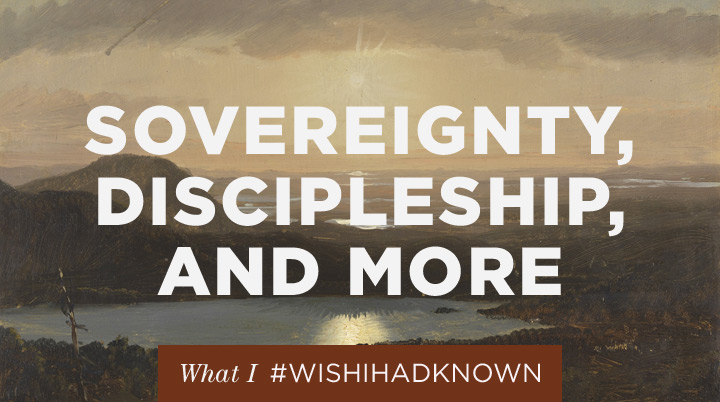Latest
-
Objections to the Christian Faith from the Unchurched and De-Churched
 Tue Dec 02, 2014
Tue Dec 02, 2014
by Resurgence -
Craig Groeschel: We Innovate for Jesus
 Tue Oct 14, 2014
Tue Oct 14, 2014
by Resurgence -
Mark Driscoll: Revelation
 Tue Oct 07, 2014
Tue Oct 07, 2014
by Resurgence -
RESURGENCE LEADERSHIP #034: JOHN PIPER, WHY I TRUST THE SCRIPTURES, PART 2
 Tue Sep 30, 2014
Tue Sep 30, 2014
by Resurgence -
Resurgence Leadership #033: John Piper, Why I Trust the Scriptures, Part 1
 Tue Sep 23, 2014
Tue Sep 23, 2014
by Resurgence

Archives
What I wish I’d known about sovereignty, discipleship, and more:

Yancey Arrington shares how he learned to stop reading the Bible like Aesop’s Fables, plus what he wishes he had known about God’s sovereignty, discipleship, theology, and preaching.
What I wish I’d known about discipleship
It’s found in a network of relationships.
I was taught that “real” discipleship was only found in one-on-one relationships where Person A helps Person B grow in the faith for a certain period of time. Then, once Person B has matured to a certain degree, he or she is expected find a Person C to disciple.
However, the more prevalent biblical picture is that discipleship occurs in a network of relationships. When Person A is connected to a local church, he or she is taught by teachers and preachers, exhorted by prophets, and experiences the regular ministry of those in the church who bear burdens, use their gifts, intercede in prayer, and do “life on life” with Person A.
Discipleship occurs in a network of relationships Tweet
Knowing the truth of “discipleship as network” would have kept me from feeling guilty for not having a Person B at any specific time in my life. And it would have freed me up to joyfully use my gifts, talents, and passions to help a myriad of people grow in Jesus.
What I wish I’d known about the sovereignty of God
It impacts your worship more than you can imagine.
I remember it like it was yesterday.
I was in my early twenties and attending seminary. I was at my house, just hanging out in my room. Then, within mere moments, I was face down on the floor, weeping with gratitude and telling God how much I loved him.
What brought about this impromptu but profound worship experience? Meditating on the wonderful truth of God’s sovereignty, especially as it relates to salvation, had overwhelmed me in the moment. Growing up I was warned this doctrine would frighten my young faith and provoke questions that ultimately would hurt instead of help me. But what I experienced is that while learning about the greatness and grandness of God did blow my mind in wonder, it also broke open my heart in worship. Indeed, it still does to this day.
What I wish I’d known about the theology
It’s for everyone.
If theology simply means the study of God, then not only is every Christian a theologian, but every Christian is called to learn theology. For too long theological disciplines like systematic theology and biblical theology have been placed on the top shelf for academicians and scholars. But this shouldn’t be. All Christians, from the very young to the most mature, need to care about deepening their faith through theological engagement.
The greatness and grandness of God blew my mind in wonder and opened my heart in worship. Tweet
For several years I have taught systematic theology for the laypersons in my church, and it’s not uncommon to hear participants say at its conclusion, “Learning theology has changed my life!” I’m convinced that theology needs to be on the bottom shelf. If you haven’t started it yet, start now!
What I wish I’d known about the Bible
It’s a Story more than a Rule Book.
“It’s easy Yancey. Think of it this way: B.I.B.L.E. = Basic Instruction Before Leaving Earth.” Most of my life I was taught God’s Word was primarily a rulebook for living. Yes, the Bible told me about Jesus, but I primarily learned to approach the Bible like an Aesop’s Fables for Christians, where I would receive moral teaching showing me how good Christians live.
But while the Bible gives much instruction on life, it’s primarily a story—the one true story about God’s gracious plan to rescue the world through the person and work of Jesus. To have known this early in my upbringing would not have led me to make light of the Bible’s rules, but put them within their proper context. The Bible is not primarily about me. It’s about Jesus.
What I wish I’d known about preaching
Be a better you than a poor someone else.
I preach at a church where I share the pulpit with another pastor. He is a master preacher and incredible to hear. When I first began preaching, I found myself implementing his habits, mannerisms, and style in the pulpit. However, my attempt to imitate him worked against me. I found myself becoming increasingly tired, depressed, and ineffective each Sunday.
The Bible is not primarily about me. It’s about Jesus. Tweet
That’s when I decided to lean into how God uniquely wired me for preaching. To be honest, getting comfortable with myself was a hard and lengthy process. It took years to find my voice. But when I did, everything changed. Preaching started to become a great grace in my life. It was energizing, encouraging, and exciting. I wasn’t the only one who noticed it either; many in my church did as well. I just wish someone would have told me that when it comes to the pulpit, I would be a better me than a poor version of someone else.